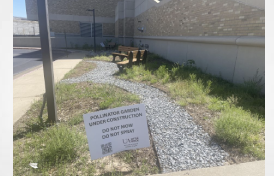In the 1970s, environmental law societies formed on law school campuses across the nation as part of the environmental movement. These organizations aimed to introduce students to the issues surrounding the environment and the practice of environmental law. Today, students at Bowen are not just learning about environmental issues or the laws in place to protect the planet; they’re taking action, applying knowledge beyond the walls of the classroom to help preserve Earth’s natural resources. Their most recent project — a pollinator garden on the east side of the law school’s campus.
In recent years, pollinator gardens have grown in popularity, especially among environmentalist and even the federal government, who in 2014 established a federal task force to promote the health of honey bees and other pollinators. The government noted the significant loss in pollinators in years prior as a serious problem requiring immediate attention to ensure the sustainability of the U.S. food production system and to protect the environment. Among the panel’s recommendations: encourage more pollinator-friendly plantings – setting off a wave of pollinator gardens across the nation.
“Our environment, globally, is in trouble,” says Lynn Foster, professor emeritus and faculty advisor to the school’s Environmental Law Society. “What’s happening is that native plants are being destroyed. There are many causes of the destruction, including habitat loss, non-native invasive species, and herbicides.”
Foster explains there are 44 million acres of non-native lawn in the U.S. creating what is known as deadscapes — landscapes that provide no food or habitat for wildlife, thus contributing to the loss of pollinators such as bees and insects. Pollinator gardens are an attempt to curb the loss of native pollinators by providing them with food and habitat. The gardens can also produce seeds and berries for birds, which have significantly decreased in number over the years.
Foster, a member of the Central Arkansas Master Naturalists, presented the idea of a pollinator garden on campus to the student members of Bowen’s Environmental Law Society. Enthusiastic about the prospect of a pollinator garden on campus, the students sprang into action, teaming up with Foster and a team of master naturalists to set the project in motion.
“We were excited about the prospect of starting a pollinator garden on campus,” Katy Wright, a second-year law student and Vice-President of the Environmental Law Society, said. “I immediately thought it was a fantastic idea, but I was worried about the location and how the garden would be maintained.”
There was plenty of work to be done, but the students were up for the challenge. From location scouting and approval processes, to fundraising, plant selection and garden building, the students had a hand in it all.
“We initially discussed creating a garden on one of the school’s balconies,” Wright said. “Luckily, we were able to secure the current location — an area of land on the east side of the law school — which allowed us to do more with the space.”
With the location identified, the society’s officers —Hannah Frey, Katy Wright, and Hannah Gore Gipson — proceeded to fundraise, each contributing information to applications for grant funding, and organizing a fundraiser of their own to help fund the project. The team designed t-shirts and sold them to students and the community with all proceeds going towards the garden.
“I was involved with getting the project approved with campus leadership and securing a grant from the sustainability committee to help fund the project,” Hannah Frey, President of Bowen’s Environmental Law Society said. “Our mission is to educate and advocate…and we wanted to do that in a way that the Bowen community hadn’t experienced before — a nice little nature spot for people to enjoy.”
On planting day, the students joined Professor Foster and other master naturalists including Steve Hyatt, information technology manager at Bowen, and master naturalist in-training, Melissa Serfass, Bowen’s electronic resources and reference librarian, to begin work in the garden.
Today, the garden has native plants that bloom from February through November and produces food and habitat for pollinating insects and other pollinators. Additionally, it serves as an educational tool and a recreational space for the Bowen community. Each plant is identified with signage and a QR code linking visitors to online information including pictures of the plant and how it serves the ecosystem in terms of hosting insects and supporting pollinators.
“The pollinator garden is a physical example of what it means to be a good steward of what you have in front of you…,” says Hannah Gore Gipson, secretary of Bowen’s Environmental Law Society said. “We took a very small area in the middle of a concrete parking lot and university campus to foster a more sustainable and beneficial ecosystem for our community. Working on this project and being a part of the Environmental Law Society has truly impacted my life in profound ways by allowing me to see that there is a place for environmental law and positive changes in our state.”
Professor Foster and the Environmental Law Society planted about one-third of the garden in fall of 2023 with the help of faculty, staff, and other master naturalists. The group plans to finish planting the remaining two-thirds of the garden this spring.





